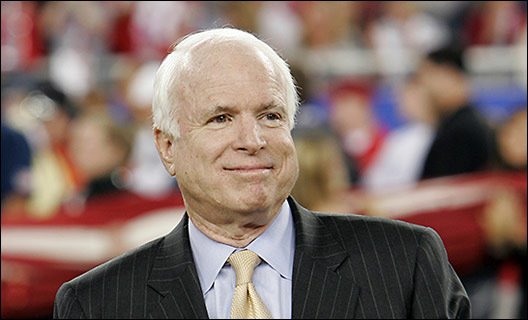Updated 22 Aug 2008

John McCain has a mixed record on the environment, but he’s long been outspoken about global warming. He introduced the first major bill in the Senate to address it: the Climate Stewardship Act of 2003, cosponsored with Joe Lieberman. In May 2008, he unveiled a new plan for tackling the problem, a cap-and-trade system with a series of targets for gradually reducing carbon emissions to 60 percent below 1990 levels by the year 2050. The plan would give away many pollution credits instead of auctioning them off, and would give polluting entities expansive leeway to buy carbon offsets instead of reducing their own emissions. McCain used to oppose ethanol subsidies, but upon launching his current presidential campaign, he has changed his tune. He also changed his position on offshore drilling (but he still opposes drilling in the Arctic Refuge). McCain wants to build 45 new nuclear power plants by 2030 and spend big on “clean coal” technology; he also expresses support for wind, solar, and other renewables, but doesn’t believe they need government assistance. The League of Conservation Voters endorsed McCain in his 2004 Senate campaign, despite the fact that he’s gotten low voting scores from the group over the years (including a zero for 2007); McCain’s lifetime LCV score is 24 percent. (This year, LCV endorsed Obama.)
Read an interview with John McCain by Grist and Outside.
Key Points
- Has said global warming would be one of three key issues for his presidency.
- His cap-and-trade plan for fighting climate change calls for gradual reductions in U.S. greenhouse-gas emissions from utilities, transportation fuels, and large businesses, with a target of cutting emissions to 1990 levels by 2020, and 60 percent below 1990 levels by 2050.
- Cosponsored the first bill in the Senate calling for mandatory reductions of greenhouse-gas emissions, in 2003. The 2007 version, the Climate Stewardship and Innovation Act, is less stringent than many other climate bills currently in Congress. It would cap global-warming emissions from utilities, industry, and transport at 2004 levels by 2012 and then gradually decrease emissions to about 30 percent of 2004 levels by 2050.
- Has been an outspoken critic of the Bush administration’s lack of action against climate change.
- Believes the U.S. should embrace nuclear power as a way to generate energy without directly producing greenhouse-gas emissions. His climate plan would take some of the money raised from auctioning emission allowances and make it available for nuclear power R&D.
- In April 2008, began advocating for a summer “gas-tax holiday” to ease consumer prices at the pump. The proposal would suspend the 18-cent federal gasoline tax and 24-cent diesel tax from Memorial Day to Labor Day and cost the government some $10 billion.
- Wants to “find a way to use our coal resources without emitting excessive greenhouse gases,” and supports public-private partnerships to develop high-tech systems for coal gasification and carbon capture and storage.
- Used to criticize ethanol; now lauds ethanol, but still opposes government subsidies for it.
- Has opposed drilling in the Arctic National Wildlife Refuge.
- Has been endorsed by Republicans for Environmental Protection for his climate policies.
Video
Watch McCain answer a question about climate change at a Town Hall meeting in Gilford, N.H., on June 5, 2007:
Watch McCain talk about ethanol and global warming in New Hampshire on March 17, 2006:
Watch McCain talk about the importance of nuclear power:
Watch McCain flip-flop on ethanol:

